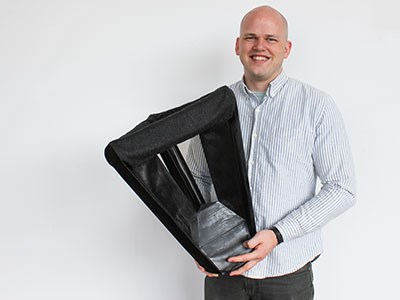Patrick Danielson was uncomfortable. His office chair left him with bad posture and he knew his health was suffering. He swapped out the standard armed and backed chair for a stool, and when he started to feel better, he never went back.
Danielson’s office chair wound up being the inspiration behind his Sudbury-based startup company, FORMid, which is currently designing a customizable chair for office use.
The stool, which resembles a badminton birdie with the ball end pointed downwards, won the Judge’s Choice Award at the third annual PITCH competition at Sudbury’s NORCAT centre in April.
“Sitting is the new smoking, and physical inactivity is the fourth largest cause of mortality,” Danielson told the audience.
The inverted triangle seat certainly doesn’t encourage inactivity, as the round, weighted bottom allows for continuous movement and enables good posture, without toppling over.
Danielson caught the judges’ attention with his minimalist ergonomic seat that uses paper substrates as the frame, and pulverized paper from the scraps to reinforce it. It’s a sustainable and healthy choice. So far, his project has already received funding from FP Innovations, a forestry research and innovation organization, to adapt DOMTAR materials to the project.
The proposed cost at the moment is $455 for a standard unit, which Danielson said is the middle of the pack for ergonomic seating options. However, he said, ideally they’ll drop the price.
“Those who need it the most might not be able to afford that,” said Danielson. “If it’s possible, we’ll try and make it accessible.”
The stool will be manufactured out of Sudbury, where Danielson works as a part-time instructor at Laurentian University’s School of Architecture. While Danielson was born and raised in Sudbury, and completed an undergraduate degree in biomedical biology at Laurentian, he spent around seven years in Vancouver completing a Master’s in architecture and working for various firms. He moved back to Sudbury in 2015 to be closer to family, and found Sudbury to be an encouraging environment for entrepreneurs.
The FORMid team currently consists of Danielson, his brother Michael, and his occupational therapist wife, Leila Angrand. The health benefits will be rigorously tested in a biomechanical study on the prototype that will supply live feedback on posture and other variables.
The chair combines Danielson’s biomedical biology and architectural backgrounds.
“Scale doesn’t matter; the process is the same,” said Danielson, who said the design reminds him a lot of origami he used as a child.
He said that in the design field, often the model used is that of a tree — in which individual components are built to fit into a broader scheme. What he hopes to do with the chair is develop a seed, in which the concept can be changed to adapt to the unique user. The user will also be able to choose different colours and prints to suit their office.
At this point, Danielson’s timeline is to complete the prototype within the year and advance to commercialization in 2017.
Other competitors in the PITCH competition included People’s Choice winner Daryl Dominique and his Hexic Monitoring Systems, which monitors industrial vehicle components to predict malfunctions ; Kacey Cayen, who presented HAPSYS, a wearable vest technology adapted from video games with potential for health and safety training; and Callen McGibbon, who heads up REPerformance, a fitness application for phones.
The competitors received coaching through NORCAT on how to pitch and commercialize their products.
“It was really helpful how insightful they were in targeting what an audience needs to hear,” said Danielson, who added the coaching helped him with intellectual property rights and funding. “But, it was an insane amount of work.”




